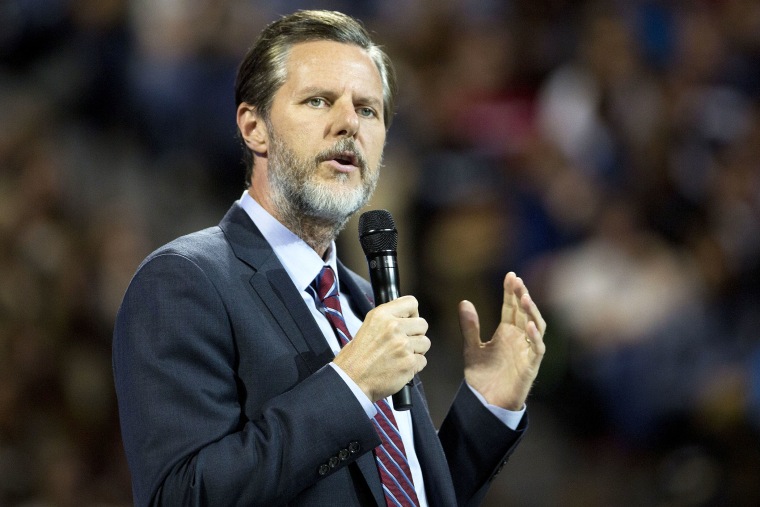After Donald Trump publicly defended racist activists, to the delight of prominent white supremacists, the White House hoped the president's Republican allies would rally to his defense. That clearly didn't happen.
Last week, bookers and producers for a variety of news programs -- including colleagues of mine at MSNBC -- reached out to dozens of GOP officials about appearing on camera to defend Trump's comments, and Republicans simply weren't interested. That continued yesterday: in an exceedingly rare sight, there were no elected GOP officials on any of the Sunday shows.
In an interesting twist, when ABC News' "This Week" asked the White House for a spokesperson willing to appear as a guest, officials directed the show's producers to, of all people, Jerry Falwell Jr., the president of Liberty University and a member of the White House's Evangelical Advisory Board. Falwell was one of the few people to defend Trump last week, and he did so again yesterday with ABC's Martha Raddatz.
RADDATZ: [Trump] said, there were "very fine people" on both sides. Do you believe there were very fine people on both sides?FALLWELL: He has inside information that I don't have. I don't know if there were historical purists there who were trying to preserve some statues. I don't know. But he had information I didn't have. And I believe that he spoke what was...RADDATZ: What made you think he knew that...FALLWELL: I think he saw videos of who was there. I think he was talking about what he had seen, information that he had that I don't have.
This is a curious line of defense. On Friday, Aug. 11, tiki-torch-wielding activists were filmed chanting, "Jews will not replace us." Other participants at that Charlottesville rally were photographed making a Nazi salute. Trump said of these activists, “Not all of those people were neo-Nazis, believe me. Not all of those people were white supremacists by any stretch.”
Were we supposed to "believe" him because, as Falwell put it, Trump has unique "information" about these activists' motivations? From Falwell's perspective, does the president have some kind of special insights into what the torch-wielding racists were thinking?
It's not surprising that Falwell, son of the televangelist who blamed American liberals for 9/11, would want to defend his ally in the Oval Office, but after having a week to think about it, it's notable that he couldn't think of anything more compelling than this.
NPR reported yesterday, meanwhile, that these developments have not gone unnoticed at Liberty.
A group of alumni from one of the country's most influential evangelical Christian universities is condemning their school's president for his continued alignment with President Trump.A small but growing number of Liberty University graduates are preparing to return diplomas to their school. The graduates are protesting university President Jerry Falwell Jr.'s ongoing support for Trump. They began organizing after Trump's divisive remarks about the deadly white supremacist protests in Charlottesville, Va.Chris Gaumer, a former Student Government Association president and 2006 graduate, said it was a simple decision."I'm sending my diploma back because the president of the United States is defending Nazis and white supremacists," Gaumer said. "And in defending the president's comments, Jerry Falwell Jr. is making himself and, it seems to me, the university he represents, complicit."
When Martha Raddatz asked about this yesterday, Falwell said, in reference to Gaumer's comments to NPR, "He completely misunderstands my support. My support for the president is his bold and truthful willingness to call terrorist groups by their names, and that's something we haven't seen in presidents in recent years."
It fell to Raddatz to remind Falwell that Donald Trump has not unequivocally characterized the deadly attack in Charlottesville last week as domestic terrorism. In fact, the president, after obsessing for years about the phrase "radical Islamic terrorism," was asked last week about the attack that took Heather Heyer's life, and whether it constituted terrorism. He replied, "You can call it terrorism. You can call it murder. You can call it whatever you want."
Falwell concluded, in an apparent praise, that Trump "doesn't say what's politically correct, he says what's in his heart." That's probably true. But what if what's in his heart is offensive, divisive, and racially inflammatory?
